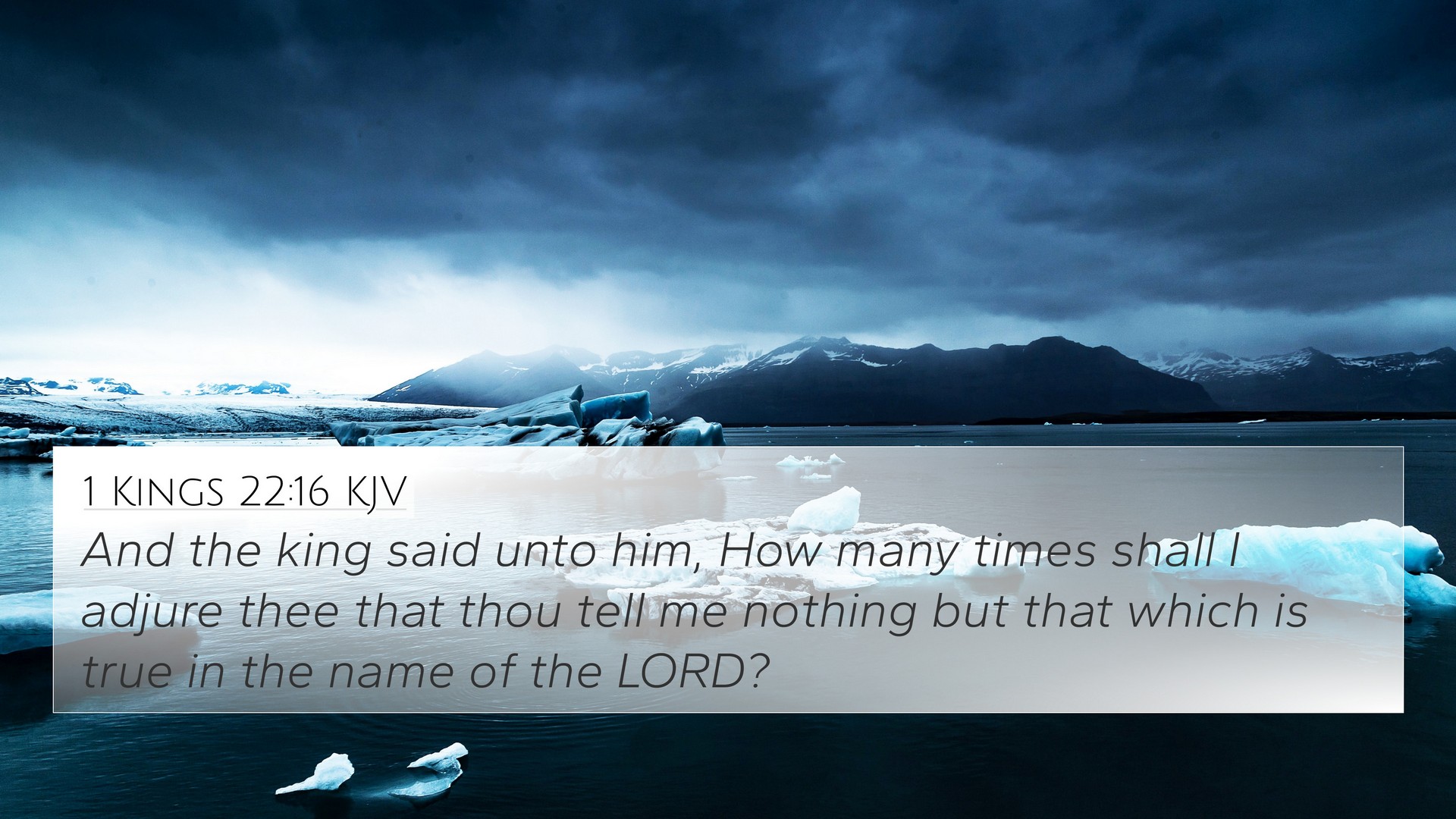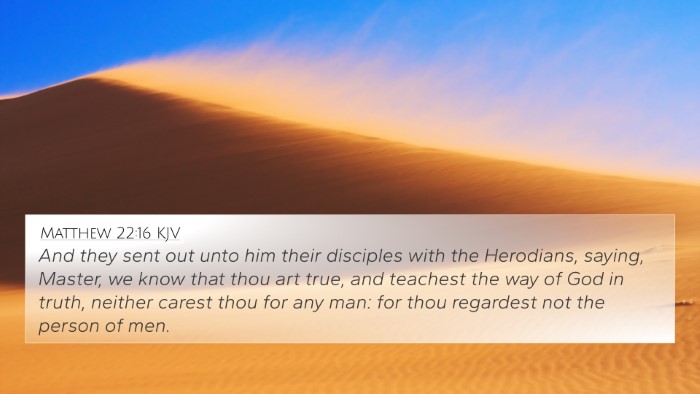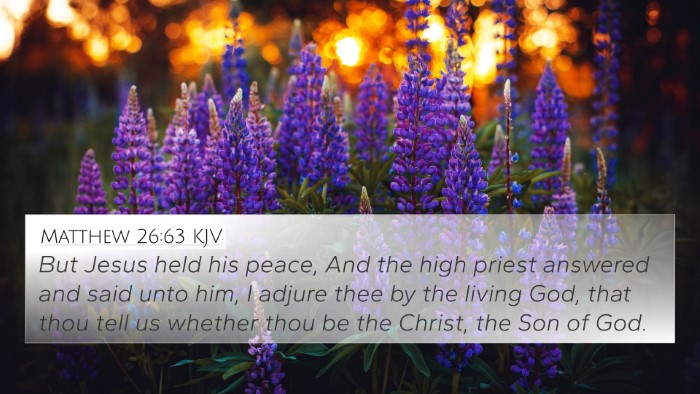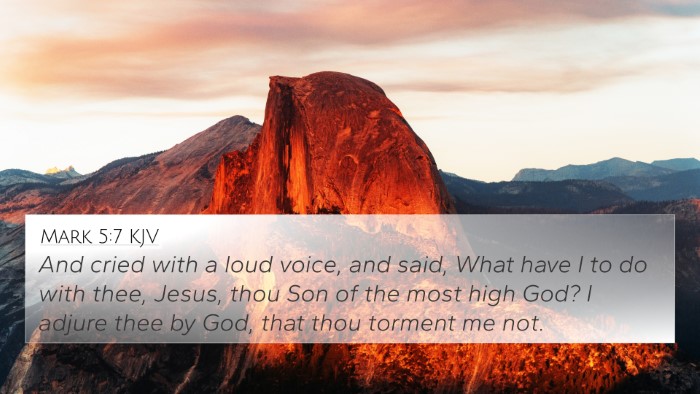Understanding 1 Kings 22:16
Bible Verse: 1 Kings 22:16
In this verse, King Ahab speaks to Micaiah, expressing frustration over the prophet's consistent negative prophecies regarding Ahab's military ventures. Ahab states, "How many times must I make you swear to tell me nothing but the truth in the name of the Lord?" This inquiry reveals Ahab's disbelief and irritation with Micaiah's previous warnings.
Commentary Insights
Various public domain commentaries provide a deeper understanding of this passage:
- Matthew Henry: Henry highlights Ahab's disdain for truth when it contradicts his desires, illustrating the king’s hard-heartedness. Ahab's reluctance to heed God’s word reveals a significant spiritual blindness.
- Albert Barnes: Barnes explains that Ahab’s question signifies his acknowledgment of Micaiah’s previous truthful proclamations but his inability to accept them. This introduces the theme of neglecting prophetic voices that deliver unwelcome messages.
- Adam Clarke: Clarke emphasizes the irony in Ahab’s statement, stating that while he sought the truth, he rebuffed it each time. He viewed Micaiah as a thorn in his side, representing God's unwavering truth in a world influenced by his desires.
Thematic Connections
This verse encourages a deeper examination of the broader theological themes and insights present in the relevant biblical narrative:
- Refusal to Accept Truth: Ahab’s questioning of Micaiah reflects a common human tendency to avoid uncomfortable truths, a theme echoed in multiple scriptures, such as Proverbs 9:8 and John 3:19-20.
- The Role of the Prophet: Micaiah serves as a faithful messenger, paralleling other biblical prophets such as Jeremiah (Jeremiah 26:8-9) and Ezekiel (Ezekiel 2:5), who faced resistance for their messages.
- God’s Sovereignty: The narrative emphasizes that God is sovereign, providing a warning to Ahab through Micaiah’s prophecies, analogous to the theme in Isaiah 55:11, where God's words shall not return void.
Bible Cross References
To further enrich the study of this verse, here are some cross-referenced verses that align with the themes found in 1 Kings 22:16:
- Proverbs 1:24-25: This passage acknowledges the consequences of ignoring wisdom and rejecting truth.
- 1 Kings 22:8: This reveals Ahab's preference for prophets who speak favorable words, underscoring his desire for validation over truth.
- Jeremiah 14:13-15: Explores the tensions between God’s true prophets and the false prophets that offer reassuring lies.
- 2 Chronicles 18:13: Parallel account that reinforces Micaiah’s stance and prophetic integrity amidst Ahab’s desires.
- Isaiah 30:10: It illustrates people's desire to hear flattering things rather than the hard truths of God’s message.
- 2 Timothy 4:3: Reflects on the New Testament warning against those who would rather listen to fables than sound doctrine, similar to Ahab’s preference.
- Matthew 7:15: A call to discernment regarding false prophets; a timely reminder to heed true prophecies even when difficult.
Bible Study and Cross-Referencing Techniques
Understanding the scripture involves recognizing these connections, which can be further explored through the following:
- Using a Bible Concordance: This tool can help locate verses that highlight the inherent themes of truth and prophecy.
- Bible Cross-Reference Guide: Utilizing guides can provide a systematic approach to find connections between themes across scripture.
- Cross-Referencing Bible Study: Engaging in cross-referencing can illuminate the dialogues between different parts of the Bible, revealing interrelated truths.
Conclusion
The inquiry of Ahab in 1 Kings 22:16 is not merely a royal complaint; it reflects a broader human tendency to reject divine truth. Through the insights of various biblical commentaries, we see the immense significance of this struggle with truth and the responsibilities of messengers of God. As we explore other verses through cross-referencing, we gain richer theological understanding and insights into how this theme persists throughout Scripture.










